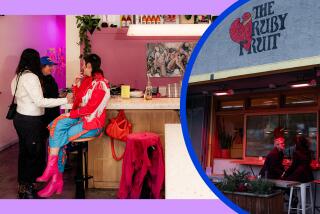Achieving Beervana in Portland, Ore.
Reporting from Portland, Ore. â I canât believe they want coffee.
Granted, it is 9:30 a.m. when I pick up my friends Jim and Lenora at the Portland airport. But in the weeks Iâve anticipated their visit, Iâve had beer on my brain.
FOR THE RECORD:
Portland restaurant: An article in Sundayâs Travel section on microbreweries in Portland, Ore., misspelled the name of the Indian restaurant Vindalho as Vindahlo. â
Jim is a home brewer â or was, back in the dark ages before the microbrewery renaissance. Some of my fondest memories of our long friendship involve conversations over bottles cooled in the crawlspace of his New Mexico house. So I was eager to show off, if not my own brewing chops, those of my new hometown.
With about 40 small breweries in town â new ones open so frequently itâs hard to keep track â Portland has overtaken Munich, Germany, as the brewing capital of the world. But numbers alone donât capture Portlandâs status among true beer aficionados, the kind who would sooner quaff hemlock than a Miller or a Bud. Thereâs something about this most livable of cities that encourages innovation.
âYouâve got to have the right culture of people,â says Marc C. Martin, a local beer writer who is launching a brewery tour business. âPortland is eco-friendly, green, bicycling, Birkenstock-wearing â itâs a culture that lends itself to unusual and unique things.â
Nationwide, so-called craft breweries account for only about 4% of all beer consumed (in Oregon, itâs 12%), but they inspire near-religious devotion. Oregonâs breweries draw more tourists than its fabled wineries, according to a 2006 study conducted for the state.
But Portland is known for great coffee too. So from the airport we make a beeline to Helserâs, a breakfast spot in the cityâs northeast quadrant, for caffeine and generous plates of buttermilk pancakes and salmon hash. Thus fortified, we head to our first beer tasting â at the Portland Farmers Market.
Do you sense a theme here? Portlanders are passionate about fresh, local food, whether vegetables, cheese or beer made from just-picked hops. Fueling Oregon beer mania is the abundance and variety of hops planted here. Beerâs other key ingredients are plentiful as well: top-quality water, barley for making malt and a laboratory that is one of the nationâs two main producers of brewerâs yeast.
My goal at the bustling market, held Saturdays on the Portland State University campus, is a stall operated by Upright Brewing. Though just a year old, it is generating lots of chatter among beer geeks.
Jim lifts a small plastic cup of Gose beer to his nose and inhales deeply. The cacophony of the market fades. We could be in Paris for a wine judging.
âCitrus,â he says. Inhales again. âLemon.â
He takes a sip, making little lip-smacking sounds. âEffervescent,â he says. I canât tell whether heâs just humoring me.
Upright is â and isnât â a classic example of Portland craft beer. It isnât âhoppy,â a heavy-on-the-hops style that has come to define Pacific Northwest ales. But in creating something thatâs not typical, Upright owner and brewer Alex Ganum is very much in the Portland tradition.
Many of his beers are Belgian and French farmhouse-style ales. Gose is an obscure German-style wheat beer with the unusual addition of coriander and salt, the latter contributing that hint of sparkle.
We taste Uprightâs light and refreshing Four, named for the percentage of alcohol it contains, and the dry Flora Rustica, then go in search of a classic hoppy ale.
But man cannot live on beer alone, so first we stop at Quintana Galleries. Jim and Lenora are avid collectors of Pueblo Indian art from New Mexico. Quintana â owned, it turns out, by a former New Mexican â carries dazzling examples of Northwest coast masks, boxes and intricately carved panels.
The gallery is in Portlandâs Pearl District, blocks of downtown warehouses converted to shops, restaurants â and pubs. We stop at the first one we come to, Rogue Ales Public House, where we are promptly overwhelmed by the 32 beers on tap.
Jim orders the Juniper Pale Ale; he pronounces the after-taste more bitter than floral. (Bitter is not an insult but a characteristic of hoppy beer.)
Lenora has the Mocha Porter.
âDelicious,â she says, âA hint of chocolate on the back of the tongue.â
I settle on the Château Rogue Single Malt Ale with floral hops and a slightly sweet aftertaste. We nurse our beers at a sidewalk picnic table until the patchy sunshine gives way to rain. Fortunately, weâre within dashing distance of Powellâs City of Books, the grand dame of independent bookstores, with more than 1 million new and used volumes.
After an hour, weâve browsed up a thirst.
The tiny Tugboat Brewing Co. is tucked away on a downtown side street. It is as different from the Rogue pub as a pilsner is from a stout.
Where Rogue is busy and a bit overwhelming, Tugboat has just six house beers on tap and a chatty bartender to guide our choices. The brew pub specializes in British-style ales, but its forte is its cozy ambience, with book-lined walls and wooden, lamp-lighted library tables.
Nixing plans for a brew-pub dinner, Lenora lobbies for Vindahlo, an Indian restaurant featuring Northwest ingredients. We feast on roasted pumpkin samosas with fresh mint chutney, saag paneer with house-made cheese, fresh spinach and tomato masala, and tender, organic lamb braised in coconut milk, chilies and curry leaves.
Like any self-respecting Portland eatery, Vindahlo has Oregon beers on tap. We order a hoppy, citric Double Mountain India Pale Ale, brewed in Hood River, Ore., and an amber ale from Eugeneâs Oakshire Brewing Co.
The next day we achieve Beervana.
First, the requisite coffee, from the Blue Kangaroo, my neighborhood roastery. Then a long ramble through Oaks Bottom Wildlife Refuge on the Willamette River, Portlandâs east-west divide. After walking up a thirst, we head to Hopworks Urban Brewery to quench it.
The 2-year-old Hopworks is the quintessential Portland brewery: Its ales are crafted from organically grown ingredients in an eco-friendly building. It even has a traveling bike bar: a locally built cargo bicycle that holds two kegs beneath an inlaid wood bar.
The beer itself is so enticing we order a sampler for the table: oversized shot glasses of all six of Hopworksâ regular ales plus four seasonals, or one-offs. Our friendly waitress throws in a bonus â cask-conditioned versions of two of the beers. âTheyâre all organic, so theyâre good for you,â she assures us as she sets down the tray.
In a town where brewmasters are rock stars (albeit understated, Portland rock stars), Hopworks owner and brewer Christian Ettinger is Elvis. He makes beers to swoon over. Lenora favors a seven-grain stout made with Stumptown Hairbender espresso (that coffee thing again). I am intrigued by the Secession Black IPA, a dark ale that tastes like a pale one. Jim is looking rhapsodic over the Gold Medal-winning regular IPA, especially the cask-conditioned version, an unfiltered, unpasteurized ale with no added carbonation.
That night over dinner at Alameda Brewhouse in the cityâs northeast quadrant, we order vegetarian burgers (made with the brewerâs spent grain) and down three fine examples of very different beers: a single-hop pale ale, an unusual Belgian-style IPA and a porter.
âHow many breweries does Portland have?â Jim asks on the way to the airport.
âForty,â I tell him.
âWeâve barely dented them!â he says.
I know heâll be back.
More to Read
Sign up for The Wild
Weâll help you find the best places to hike, bike and run, as well as the perfect silent spots for meditation and yoga.
You may occasionally receive promotional content from the Los Angeles Times.






